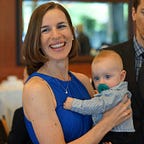MD and MBA: Worth it?
“Do you use your MBA?” I’ve heard this question hundreds of times, from doctors and doctors-to-be wondering whether they should invest their time and money in a business degree.
At the Stanford Graduate School of Business (GSB), I found two things: people, and permission.
The power of the GSB network is undeniable. But opportunities haven’t always come from the people I expected. It’s worth investing broadly in relationships and goodwill.
Being an MBA student somehow gives you license to do things you might not otherwise do. To try stuff, and fail. To ask for stuff, and get rejected. The GSB has a way of emboldening you, until eventually you succeed. But I tell anyone who asks: you don’t need to go to business school to reach for these opportunities.
Let me walk you through a few of my career opportunities from the past 10 years. Then you can tell me: what did I get out of my MBA?
#1. I spent the summer before business school exploring digital health at Venrock. I didn’t know much about venture capital before I started the internship. I was finishing my second year of medical school, eager to start clinical rotations — I planned to spend the summer on Family Medicine and Neurology clerkships. But because I’d been admitted to the Stanford GSB, the internship came my way.
It was luck, and a push from the GSB network, that got me in the door on Sand Hill Road. At Venrock, I met Bryan Roberts, who became a friend and steady sounding board throughout my residency in general surgery. Bryan would introduce me to Robin AI ten years later.
#2. As a surgery resident, I built a mobile product in India. Stanford surgery residents typically pause their clinical training for a year or more to pursue research. Instead of research, I found a way to go to Bangalore to learn from a surgeon who has been called “the Henry Ford of heart surgery.”
Dr. Devi Shetty had recently given a talk at the GSB, where his son was a student. He wanted to build technology that would notify doctors and nurses of changes in a patient’s condition. I thought I could help, so I bought a ticket to India to interview for a job that I would create for myself. Less than a year later, we had a product in live pilots in his ICU.
#3. I joined Robin AI. Halfway through my Surgical Critical Care fellowship, I decided to look for a startup job rather than a full-time surgery job. I found Robin through relationships that had endured nearly a decade of surgical training. I had credibility because of my MBA and my prior product experience. The role called for someone with deep experience in clinical medicine. It was a perfect role for me, as if I had planned it, right?
This is a narrative constructed with 20/20 hindsight. I did not plan this path. I knew I wanted to take care of patients, and deeply understand clinical medicine. And from a place of deep understanding, to introduce change that would make a difference higher up the healthcare delivery chain.
I took more than a few detours. Like when I interviewed for an investment banking internship at Lehman Brothers, months before the bank went under in the financial crisis. Some detours were learning opportunities, others… who knows.
In my role leading Product at Robin AI, I have more opportunity to draw on actual MBA coursework than ever before. But it’s definitely gotten rusty. Ten rollercoaster years have come between me and the MBA core curriculum.
So, was the MBA worth it? Totally. Could a doctor, or medical student, or anyone else also reach for these kinds of opportunities, without a business degree? Absolutely, yes, although the people and permission from the MBA definitely help. So do your thing, whatever it is. Invest in people, and don’t be afraid to fail.
